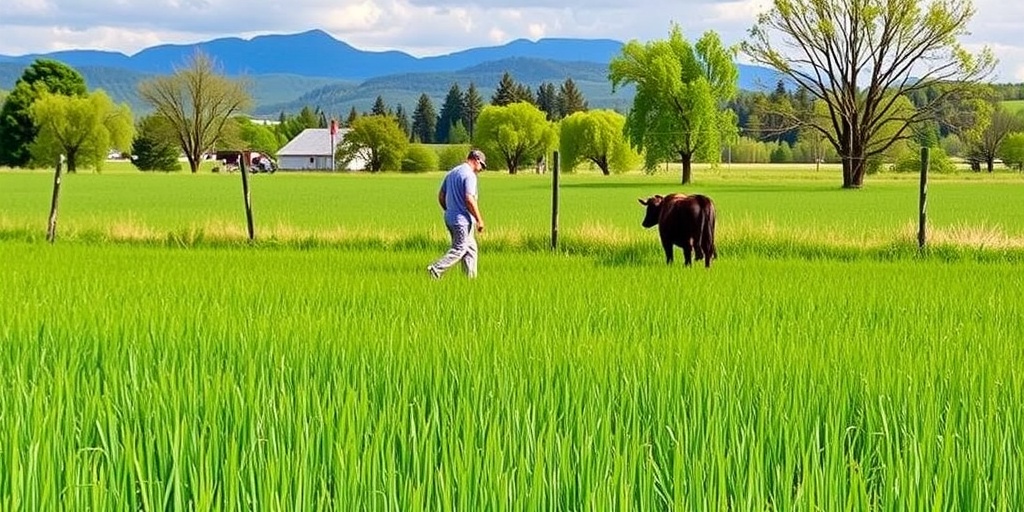Now Reading: Farmers File Lawsuit Over Removal of Climate Data from Gov Websites
-
01
Farmers File Lawsuit Over Removal of Climate Data from Gov Websites
Farmers File Lawsuit Over Removal of Climate Data from Gov Websites

Farmers and Environmental Groups Sue Agriculture Department Over Climate Change Information Removal
In a move that has stirred significant controversy, organic farmers and environmental advocacy organizations initiated legal action against the United States Department of Agriculture (USDA) on Monday, challenging the department’s recent decision to eliminate references to climate change from its online resources. According to the lawsuit, filed in the United States District Court for the Southern District of New York, the USDA directed its staff to remove various pages dedicated to climate change as of January 30, leading to the swift disappearance of vital information.
This abrupt removal included essential websites that provided crucial datasets, interactive tools, and funding details that both farmers and researchers heavily relied upon for effective planning and adaptation strategies. The lawsuit underscores that this deletion process not only eradicated important resources but also stemmed the flow of funding that had previously been promised to businesses and nonprofit organizations through various conservation and climate programs. The plaintiffs argue that this action effectively obscured essential information regarding these programs, thus hindering farmers from securing the financial resources they urgently needed to advocate for funds that were rightfully owed to them.
Despite the filing of the lawsuit, the USDA has not yet provided a public comment or response to the allegations. The case was brought forth by attorneys from Earthjustice, a nonprofit public interest law organization based in San Francisco, along with the Knight First Amendment Institute at Columbia University. They represent a coalition of plaintiffs that includes the Northeast Organic Farming Association of New York, the Natural Resources Defense Council, and the Environmental Working Group. The latter two organizations have historically depended on the USDA’s website to facilitate their research and advocacy efforts, as highlighted in the lawsuit.
Peter Lehner, an attorney representing Earthjustice, emphasized the critical nature of the information that was purged. He noted that the deleted pages were indispensable for farmers grappling with the multifaceted risks associated with climate change, which include heat waves, droughts, flooding, extreme weather events, and wildfires. The materials that were erased contained guidance on how to mitigate these risks and adopt innovative agricultural practices. For farmers, access to long-term weather data and climatic trends is paramount for planning, research, and strategic business operations.
"You can purge a website of the words ‘climate change,’ but that doesn’t mean climate change goes away," Lehner remarked, stressing the irrelevance of the USDA’s actions in the face of an ongoing environmental crisis.
The USDA encompasses several significant divisions that have a direct impact on agricultural practices and environmental stewardship, including the Forest Service, which manages national forests and grasslands, and the Natural Resources Conservation Service, which provides assistance to landowners in implementing sustainable conservation measures. The suit alleges that the directive to eliminate climate-focused pages was communicated via email from Peter Rhee, the USDA’s director of digital communications, compounding concerns regarding transparency and accountability within the agency.
The plaintiffs assert that this violation of federal laws is characterized as "arbitrary, capricious, an abuse of discretion, or otherwise not in accordance with law." They are seeking judicial intervention to mandate the agency to restore the deleted web pages and to prevent any further action that would jeopardize other vital resources related to climate change and agriculture.
Wes Gillingham, president of the board of the Northeast Organic Farming Association of New York, expressed his frustration, asserting that the timing of the information removal is particularly detrimental as farmers gear up for the summer growing season. He criticized the decision as a senseless act driven by a political agenda regarding climate change, especially in a time when farmers require access to every available piece of information to navigate the increasingly unpredictable impacts of climate change on agricultural production.
Mr. Gillingham has dedicated three decades to farming in the Catskill Mountains of New York, where he currently raises Icelandic sheep. He previously cultivated vegetables for a community-supported agriculture (CSA) program but was forced to cease operations following multiple severe flooding events that devastated his farm over a five-year span.
As head of the largest organic certifier in New York State, which is recognized as a crucial hub for small farms, Gillingham highlighted the urgent need for farmers to access reliable information regarding conservation initiatives, qualifying agricultural practices for grants and loans, and various support systems. "Right now, because of climate change and because of what farmers are facing in terms of extreme weather events, we need every piece of available information we can get,” he stressed. “If we don’t have access to that, we’re not going to make it.”
This lawsuit not only reflects growing concerns among farmers and environmentalists regarding the impacts of climate change but also highlights broader implications for agricultural policy and federal support systems designed to assist farmers in adapting to an ever-evolving environmental landscape.
Stay Informed With the Latest & Most Important News
Previous Post
Next Post
-
 01New technology breakthrough has everyone talking right now
01New technology breakthrough has everyone talking right now -
 02Unbelievable life hack everyone needs to try today
02Unbelievable life hack everyone needs to try today -
 03Fascinating discovery found buried deep beneath the ocean
03Fascinating discovery found buried deep beneath the ocean -
 04Man invents genius device that solves everyday problems
04Man invents genius device that solves everyday problems -
 05Shocking discovery that changes what we know forever
05Shocking discovery that changes what we know forever -
 06Internet goes wild over celebrity’s unexpected fashion choice
06Internet goes wild over celebrity’s unexpected fashion choice -
 07Rare animal sighting stuns scientists and wildlife lovers
07Rare animal sighting stuns scientists and wildlife lovers





















